Crusader Kings III Review
by NoChatBot · 2020-09-14
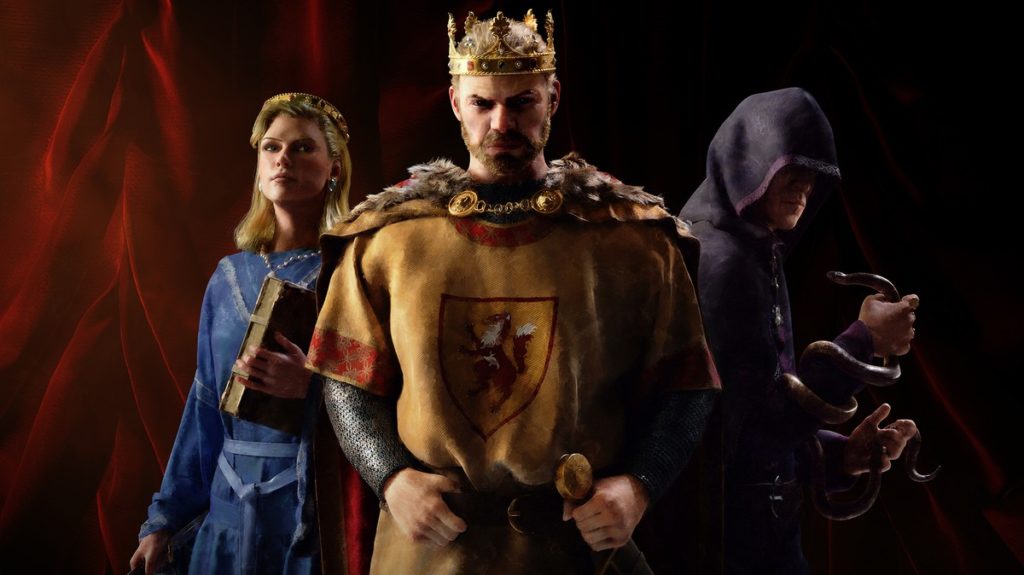

Paradox Interactive has become a giant among dwarves in its self-developed global strategy niche. Of course, the Swedish publisher and developer is not satisfied with this and has been searching for his very own Holy Grail for years: accessibility to their highly complex and extensive strategy games.
For the first time, Stellaris succeeded in removing some of these entry hurdles, and now this should also work for Crusader Kings 3. But like the quest for the Grail, the complexity of the game makes it an almost impossible undertaking, a path paved with obstacles and challenges. This test tells you where the journey in the third part of the medieval series is heading and why sometimes even deeper changes would be necessary to achieve the publisher’s goals.
Crusader Kings 3 is basically the same game as its predecessor, for better or worse. The action stretches over large parts of the Middle Ages, from either 867 or 1066 until 1453, but unlike other global strategy games, I do not directly take over a nation or culture, but decide the fate of a ruling dynasty. If it loses control of all its territories or if the noble family dies out singing and dying without sound, the game is over. So on the one hand I take care of the expansion of the empire as well as the conquest of new territories, on the other hand I deal with topics like family planning as well as the character development of the ruler and his relatives.
Every character in the game has values in martial arts, diplomacy, administration, intrigue and education. These are determined by personality traits such as greed, diligence, bravery and many others, which in turn develop from birth mainly through random events and the associated decisions. On the basis of these values the empire can be led to success in one way or another. With a capable administrator the revenues bubble up, a genius warlord increases the army’s effectiveness, and an intriguer removes his opponents in a completely undiplomatic way.
This is also where the assassination system comes into play, for which I, in turn, can use leverage obtained through targeted espionage or helpful chance events. I catch the Duke of Burgundy in flagrante delicto with a lady who does not look at all like his wife? Well, then I simply blackmail him into supporting me in the murder of the emperor, our joint liege lord. I can also bribe members of the victim’s court to join the murder plans. Unless the victim is unpopular anyway, in which case the co-conspirators flock here of their own free will.
The abilities of the current ruler also affect the outcome of events. The more educated the man or woman, the higher the chance of translating an old tome and gaining prestige or reverence in return – in addition to the classic gold, the two currencies in the game. We use gold to pay troops, build provincial improvements or bribe other people, which can then be useful in a variety of ways.
If, on the other hand, the ruler does something immoral or lawless, we pay instead with the religious piety accumulated per character or the worldly prestige, depending on whether the action is rather punishable in the eyes of God or of our fellow men. For example, if we want to get divorced, this is on the account of piety. If we declare war without a real reason, this costs prestige.
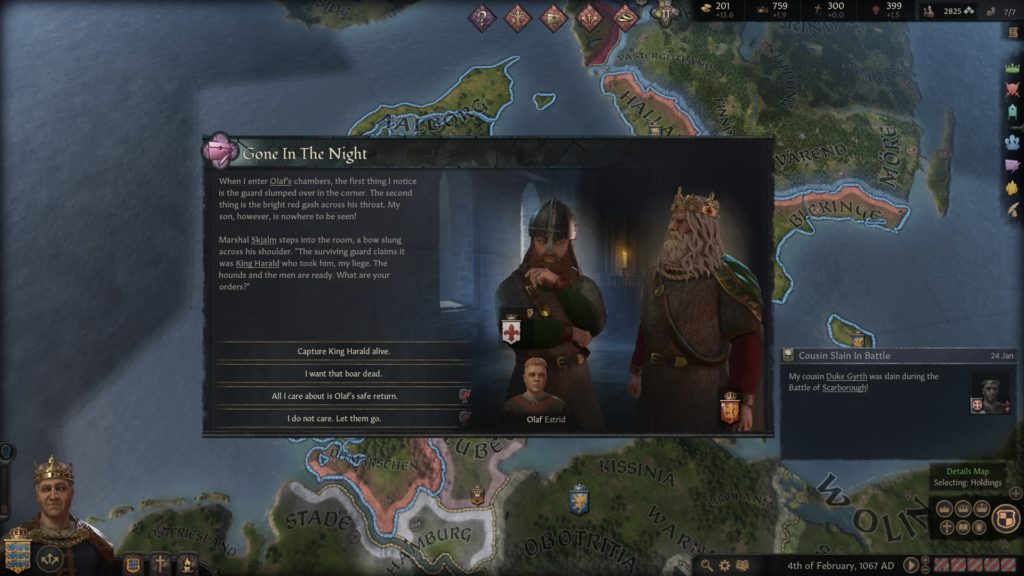
Crusader Kings 3 tells the strangest stories again because of its unique mixture of role-playing and strategy. At the political level, unique situations arise in every game even without the player’s intervention, simply because of the dynamic simulation in the background. In the end, Bavaria will rule over all of Germany and Scotland will swallow two thirds of the British Isles, while at the same time fighting back the Viking invasion.
From a role-play perspective, everything has also remained the same. Sometimes the family celebration gets a little strange, because my sister tells me that she is expecting a child from me. Another time my spy master betrays me and tells the whole world about my insignificant sins like adultery, bribery, warmongering and what else accumulates in the life of a just, content and generous ruler.
I can now also determine the life path of my main character in even more detail, namely via talent trees like – exactly – in a role-playing game. Instead of choosing from only one of ten specializations as before, there are now 15 real talent trees, three per character value. In the area of education, for example, I may distribute my passively collected points over the years in the specializations health, erudition and piety.
The talents that can be unlocked in this way are sometimes enormously powerful. In the erudition tree, for example, the ability “buy claim” awaits me, with which I can even get claims to kingdoms for a considerable sum of reverence, without anyone having to agree or being murdered.
If instead I invest in the area of intrigue in the life “seducer”, the chances of extramarital affairs increase dramatically. Because these bonuses are so powerful, the years under an administrative ruler can be quite different from those of an intriguer. In addition, there is the new religion construction kit, with which I can tinker my wishful thinking.
I cannot say how many hours were spent on the strategic marriage of my descendants and subjects: Look out for hereditary talents, hereditary claims, possible alliances that could turn out in my favor, and so on. How often I was surprised by what happened afterwards! For me, it felt more like role-playing than many a loot-loving game of the recent past.
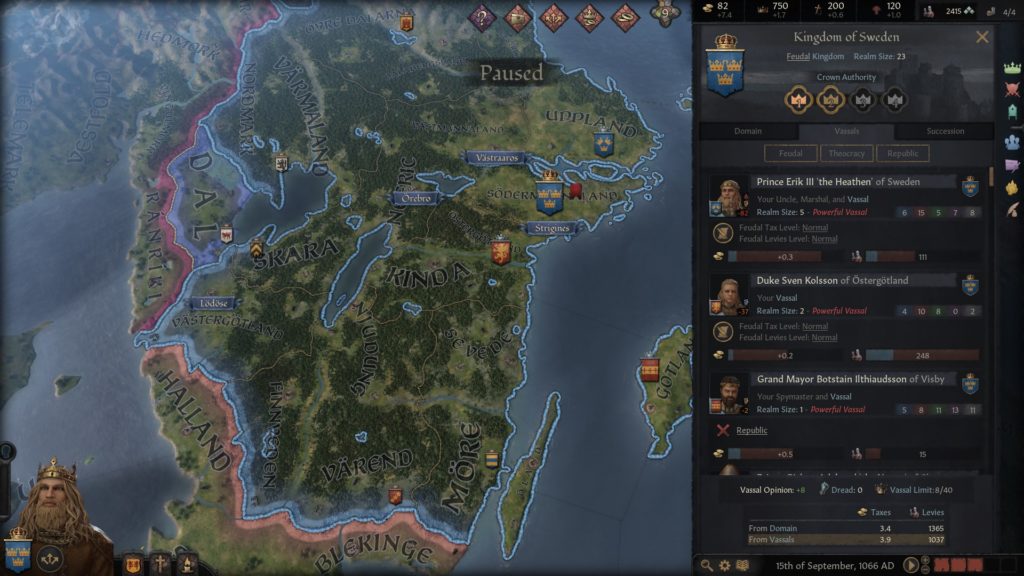
Another new, though not so central element of Crusader Kings 3 is the so-called “tension”. A character suffers tension when fate strikes, such as the death of a child, but especially when actions are taken that conflict with his personality traits. A just ruler is reluctant to arbitrarily arrest his subjects, and an honest queen suffers when she initiates a murder plot.
In this way, I must actually take into account the characteristics of my character and cannot play the God-fearing benefactor with impunity, when in reality I am a greedy, cynical sadist. Depending on the intensity, the tension manifests itself in mental breakdowns that give my character new negative characteristics. It reduces fertility and above all health. The psychological stress can be reduced by actions according to the personality, as well as by celebrations and hunting trips.
Of course – building, expanding and conquering are central parts of the experience. The strategy and management level is especially important in putting together your council, as the six members support everything you do. Appoint a chancellor, an administrator, a chief informer and a council marshal and hope that the respective church sends you a useful bishop who likes you. In the best case you will have a better half at your side, who will transfer some of their advantages to you. Each council member, including your better half, can be given three different tasks to perform, and you can turn the screws of your empire.
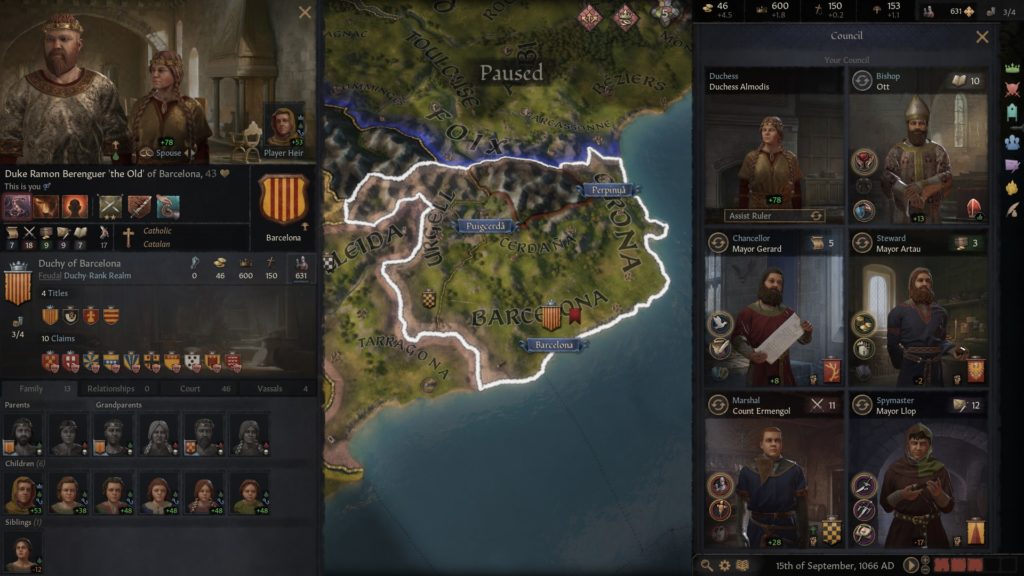
However, the contemporary graphics do not help beginners to understand the game. In a Europa Universalis 4 or even a Civilization 5 you are often overwhelmed at the beginning because of the many possibilities. In Crusader Kings, however, not only the sheer number of menus is a problem, but also the complexity of the connections.
Therefore the developers have come up with a new contextualization of the information. Similar to a Wikipedia entry, all important keywords are “linked” in every menu or event. In Crusader Kings 3, I just hover the mouse over the keyword and a text window tells me that my minions will rebel less quickly if my ruler has a high Horror value. Also in this explanation, all important words are linked again, so that I can theoretically stack the information boxes infinitely by using the click function (stay on the keyword with the mouse for three seconds).
Well known, but no less useful, are the pop-up hints at the top of the menu, which are common in Paradox games and usually point out the most urgent grievances or pending actions. For example, if a council member dies, a hint appears immediately that the position should be filled again. New and helpful is the suggestion menu, which for example points out titles that I or my descendants might inherit, or dissatisfied vassals, possible declarations of war, ransom demands, or or or. So especially beginners can see at a glance what would be worthwhile actions at the moment.
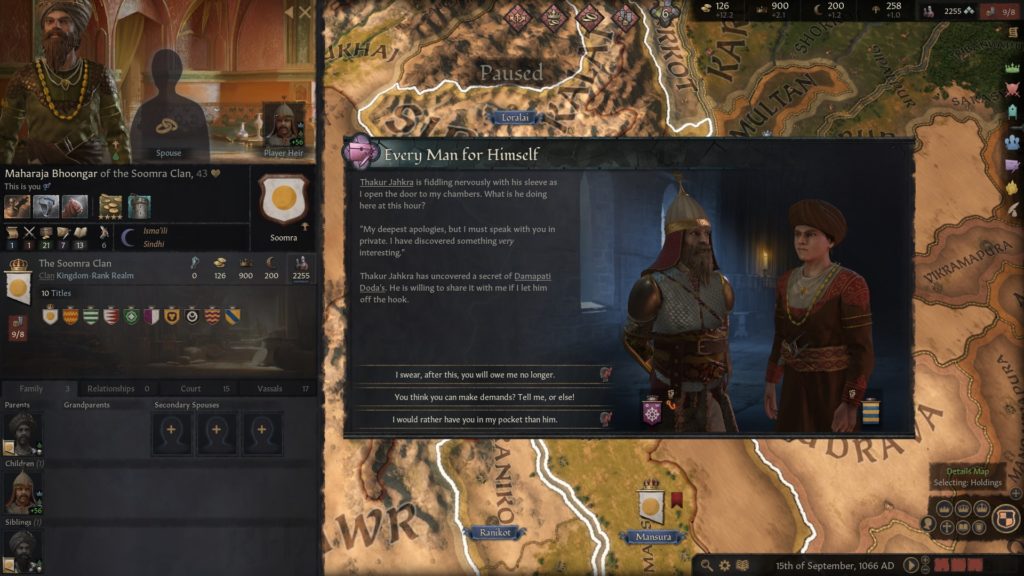
This is mainly due to the title and inheritance system, which on the one hand is the basis of the great game-mechanical flexibility of Crusader Kings 3, but on the other hand it also creates incredibly complicated special situations, which an information box can hardly explain in advance. There are too many interlocking factors for that: Is it about an emperor, king, duke, count, baron, bishop or mayor? Republic, theocracy or monarchy? Tribe, feudal empire or clan? Division of inheritance, primogeniture or election? About man or woman or child?
All this is relevant to the always central question of who gets what when a war ends or character XY dies. Here you learn solely through frustrating experience, also because the game still withholds crucial information despite context menus or at least does not actively point it out. The additional information offered is a clear improvement. Just like the 3D models of the characters, this has no mechanical effects on the game.
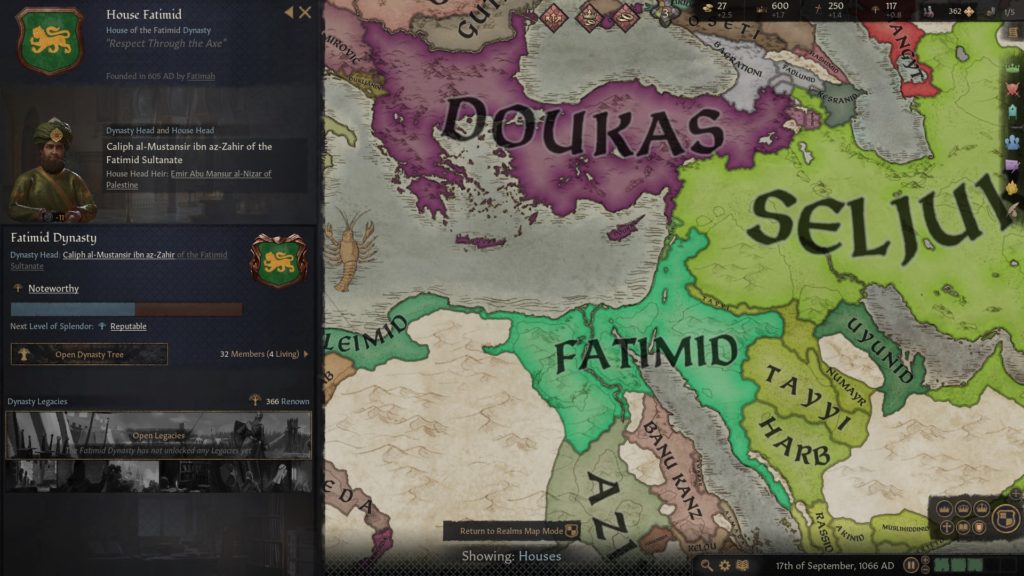
One of the peculiarities of Crusader Kings has always been that knights didn’t play a role, although this would be very obvious when simulating an entire court. Crusader Kings 3 has now thought of something for this. Depending on character focus and empire size, a ruler has between half a dozen and several dozen knights.
These knights are recruited from all available characters at the court. I can turn male vassals, family members and courtiers into knights so that they can participate in my battles as powerful special units during war. How well they perform depends on their personal fighting skills.
No problem with normal types, but if two of my three sons die in the same battle, this is clumsy game design. Because the only thing that leads to that is that I manually forbid every new relative to become a knight. The game automatically turns everyone who has enough personal fighting skills into an elite warrior. But be careful: The characters put their lives in danger and can die at any time. The probability for a death in battle is much too high.
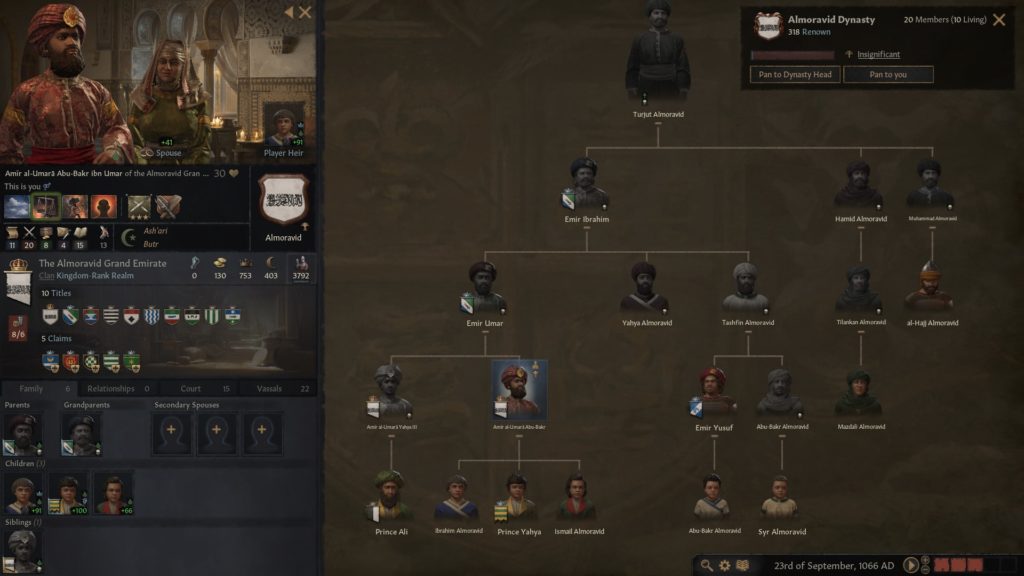
In general, the fighting is as brittle and inscrutable as in the previous part. I basically never have any idea what exactly happens there. But since usually the army with the higher manpower wins, I simply ignore the twenty influencing factors on the current dice roll and hope for the best – this should have been improved for part 3.
For this part, I may now determine one or more collection points in the realm, to which all troops are simply “beamed” instead of dacking there from their home province. This takes a little tactical depth out of the game, but brings 100 percent more joy of life. And don’t worry, the whole thing is well thought out. The developers have taken care that I can’t disband my troops at will during the war and reappear elsewhere.
The AI acts partly intelligent in war. It keeps troops together, targets the best targets and knows when it is better not to get involved in a battle. It can even handle the shipping of armies! Thanks to these advances, I have been able to win tricky wars or internal rebellions several times because my allies have consistently supported me.
But especially in crusades with many participants, the AI is completely, even completely, broken, because the attacking AI troops are chasing around like a startled chicken turd. This is especially annoying when the enemy AI with a constricted large contingent sweeps the scattered units of my side off the map one after the other.
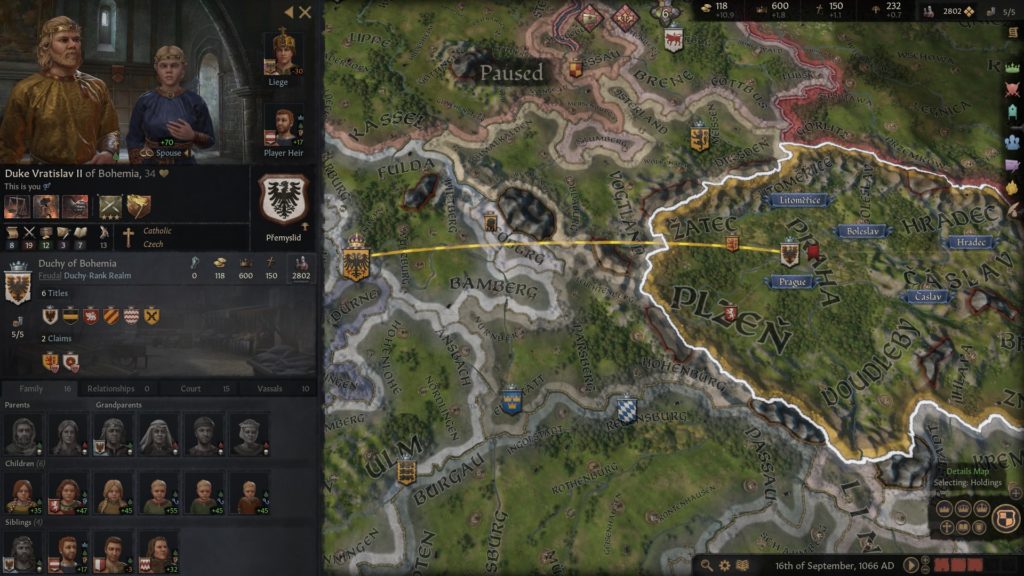
Nevertheless, there is now even less control than in the predecessor over how the offspring develop. Unless my main character personally takes over the guardianship, I can partially shape the child’s characteristics, such as whether it becomes cowardly or brave. Other notable absences include spreading disease epidemics, AI coalitions, the Silk Road, the China Interaction Menu, and Council Laws.
The quality of the events is more about back than progress. Compared to the second part, we did not encounter any supernatural events in the test. No chess with death, no devil worshippers and no eternal life. At the same time rewards are always quite meager.
The team found a good and elegant solution for the technology system, which in Crusader Kings somehow always seemed like the fifth wheel on the car. In Crusader Kings 3, the state of the art now follows the cultural area.
The higher the development of all associated provinces, the higher the speed of research. However, the much greater influence is exerted by the head of the culture, i.e. the most powerful ruler within a culture. This ruler chooses the technology to be researched and influences progress significantly through his personal educational value.
The technology of the game itself, i.e. the graphics, is functional as always with Paradox. The 3D models are pretty, but on a provincial level, to my great disappointment, there are still hardly any visual details. On the other hand, the game still runs smoothly in high details even on my aging machine.
The only limitation: When zooming, the game switches between three modes back and forth, a close terrain mode, a political map in the middle area and a very nice parchment map view at the highest level. During the transitions between these modes, the game often jerks slightly, which can get a bit annoying in the long run. On newer PCs, however, this seems to be hardly or no problem at all.
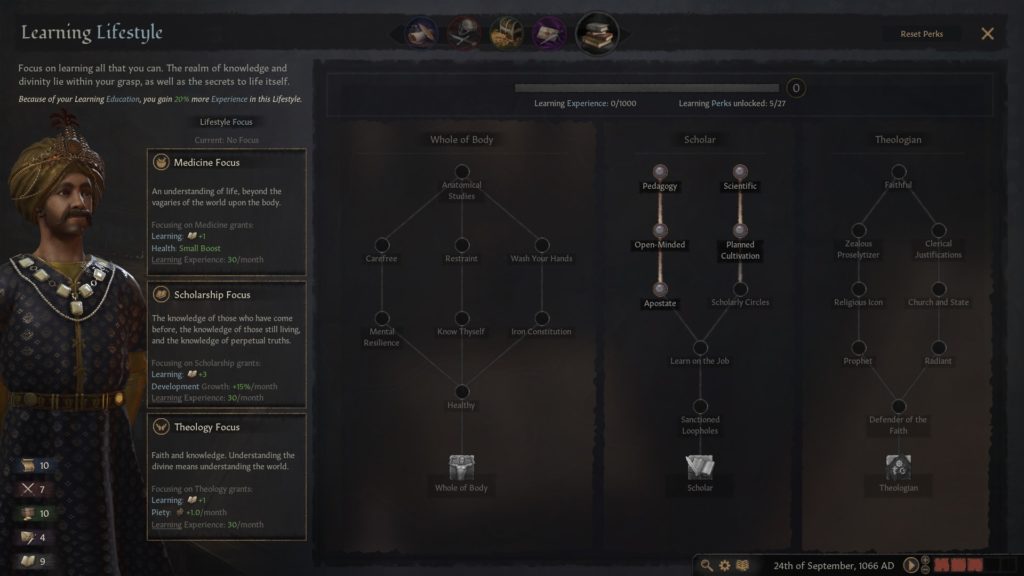
Overall Crusader Kings 3 presents itself as a finished game. The feature set is larger than in the release of the predecessor, all mechanics work and are by and large quite well balanced – although resourceful players will surely find the one or other exploit, which will never be completely avoided in such a complex simulation. The developers do a clean job with Crusader Kings 3.
In fact, Crusader Kings 3 feels more like a role-playing game than a typical 4X, even with the constant, uninterrupted view of card screens, administration menus and text boxes with multiple choice decisions. This is not a surprising insight for the initiated, but for me it is the key to understanding what this game does to me and why it is so difficult to let go. In Crusader Kings, you play one regent and not the whole empire. A small but subtle distinction that makes the whole experience much more personal.
I hope this review helps you to get e feeling for Crusader Kings 3 and what kind of strategy game it is.
What do you think about this game? Do you love it or do you hate it?




Latest Comments